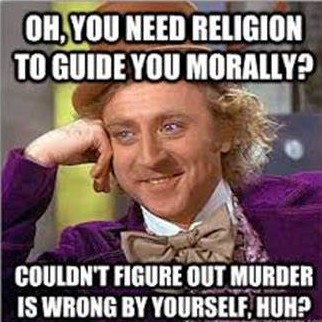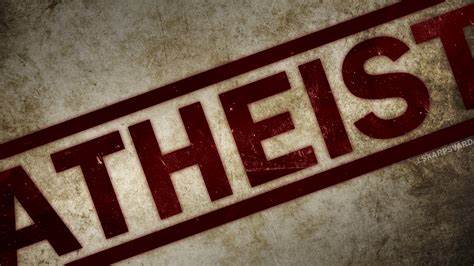Why I am not a Christian: Take me on – Giles Lennox
Welcome to Take Me On! This is a new Bubble regular in which all pupils are encouraged to write a piece on a controversial topic (within reason) in which they argue for their point of view. The idea is that the next week a person which the opposite view responds to the piece. I hope that this will encourage more debate in the school and a greater awareness not only on wider issues in our society but that people -shockingly- may have different view to you and the best way to respond is to engage in a discussion rather than just labelling them an ‘idiot’ or other derogatory terms.
I am not a Christian. In fact I am quite an outspoken atheist as many of my peers (mainly those in my RS class) will testify. There are a multitude of reasons that I am not a Christian and I would like to put a few forward today. I am well aware there are many of you in the school who are and so I encourage you to write a counter piece after considering my points.
Firstly, I would like to look at some of the ‘benefits’ of faith. The first is the obvious reassurance of life after death. Everyone finds the prospect of death worrying. The way that Christians have chosen to deal with this by believing the idea of heaven, a place where they will live on in eternity in absolute bliss. I don’t know if it is just me but this is a classic example of something that sounds too good to be true. Not only do we have no evidence to support this huge claim (apart from a book – I’ll get to that) but this is a huge thing to place your trust in. Imagine living your life will this stoic belief in God, praying to him everyday and doing his work and die. However, rather than entering in this place of absolute serenity and bliss, there’s nothing. Bit of an anti-climax. As an atheist, I win either way. Providing I have a conscience post mortem, if there is just black, I know I was right. If there is indeed a heaven, I will get in as I will have lived a moral and good life according to many theologians. Its a win win! Regardless, I am confident there is no heaven. Not only is it far too good be true (a common theme in Christianity) but I believe the idea of heaven and hell were created by the Church for the sole intention of ensuring ‘the unwashed masses’ didn’t cause trouble and so they could sell indulgences. Seems far more reasonable to suggest this than placing overwhelming place in this mystical wonderland.

On the topic of a moral life, many Christians would argue that their faith gives them direction and purpose: ie how to live a good life. The Bible gives them parables and sermons like the Beatitudes that give them a sense of morality. I say this again is another misguided belief. Everything the Bible says on morality isn’t a ‘new’ concept or idea. No one reads the Bible and thinks “Thou shall not kill. How interesting, guess I wont do that then!” Why? If Christianity is the guiding source of morality, then why isn’t this news to us? Two reasons. Firstly, parents (most of them anyway) instil this sense of morality when we are young. But where did the first humans get it from. People who argue that the work of Jesus is the basis of morality are saying that before he arrived we were all just savages with no concept of morality and as soon as he existed, we had this view of morality which seems extremely unlikely.
Frankly, early humans didn’t have a moral code. Sociobiology explores how humans have evolved a sense of morality over time. Early humans realised that to survive and thrive, they needed to be altruistic and live in societies. This basic altruism has evolved into an innate sense of morality that we find we have today and then has been implemented into law. The Theory of Evolution by the way has been proven multiple times by various scientists so I place my trust in that far more than extended faith, In some ways, we have advanced beyond the morality in the Bible. If we still followed the moral code outlined in the Bible, we would be stoning homosexuals, condemning disabled people and viewing women as subservient; all of which we now see as abhorrent. Therefore, we don’t need Christianity to have a moral code because we already have an innate, evolved one within us, one that has in no way been influenced by Christianity.

Next, the arguments for the existence of God. I realise there are hundreds of them but I have picked out the main two. The first one is the idea of design, or the teleological argument. It revolves around the idea that the world and everything within it is so complex, so intricate, so beautiful, that there must’ve been a creator, something that designed it. Paley used the example of the watch in which he argued that a watch is extremely complex which was due to it being created by a watchmaker. I find this argument incredibly unconvincing. The world in its early stages was not as it was. We have evidence like fossils that tell us we hugely different than we are now. The reason for this change is evolution. Every living creature has adapted to suit the environment in which they live. I wont bore you with the process of evolution but needless to say, nothing was created in a state in which it matched its environment completely. It was through trial and error that the world around us is what it is. This pokes a severe hole in the credibility of God.
Then you have the Bible. In it, is the documentation of every action from ‘creation’ to the death of Jesus from a Christian perspective. When I have a religious debate with Christians, they almost always revert back to “But it happened in the Bible”. I find this argument the worst of all. By doing this, you are placing your entirely system or life and belief on a book. Think about that. The Bible has no authority apart from what Christians bestow upon it. It doesn’t provide any other evidence for anything that it says happened. Take away any symbolism it has. At the end of the day, you have a book full of stories that has survived purely because of its affiliation with this huge religion. As far as convincing evidence goes, eye witness testimony is one of the lowest forms of evidence you can get. The idea of using one book to justify the existence of a deity and religion seems odd to me.
On a side note, I also find it frustrating when Christians say “Can you give me evidence God doesn’t exist?” Unfortunately, that’s not my job. I don’t need to frankly. In any argument, the person who creates the issue at its most basic level has the duty to argue and prove it. In law, the prosecution, the ones who bring the charge, have the burden of proof. The defence have to prove nothing. In this argument, the belief and idea of God was created by Christians. Therefore, they are the ones who must prove he exists. I don’t have to prove anything. Those who make the assertion God exists have to prove it. Just because I say he doesn’t, does not mean I have to prove it as I am not the one making the initial claim that starts the controversy.

Clearly, the most integral part of the Christian faith is the belief in the concept of a deity/ God. Ironically, I find this the hardest part to believe. From an early age, many of us are taught to be critical thinkers. We are compelled to assess claims using logic and reason. Therefore, I find it so hard to comprehend and justify the existence of an all loving, all knowing and all powerful being that lives outside our know universe in a idealistic kingdom where he judges people after they die. On top of that, he (through Jesus) is able to turn water into wine, walk on water and bring people back from the dead. All of things defy nature, defy reason. There are often acts that defy nature: people miraculously recover from a fatal illness, have ‘visions’ of God and so on.
These may cement a person’s faith but I see them as explainable quirks in science. It seems more reasonable that these events happened due to luck than the grace of an omnibenevolent and omnipotent deity. God to me sounds a lot like Father Christmas. I was told as a child “Father Christmas is real, have faith.” He was an omnipotent, omniscient figure who rewarded humanity for their good deeds. Shockingly, it turned out he didn’t exist! The fact there is no evidence to support this leads me to conclude that there is no logical way to defend belief outside of belief, which in itself an argument is hardly convincing. What I see ‘God’ as is a projection of humanity’s need for understanding. We have filled the gaps in our knowledge with the idea of God rather than seeking to find the answers to life’s biggest questions. As Dawkins says, it “is not an explanation, but an evasion.” It is the comforting answer but just because it makes us feel better does not mean it is the one we should accept.
I wouldn’t mind believing. The idea that there is nothing after death for example is quite frightening. Despite this, I find the more probable answer, the one that doesn’t require a huge leap of faith more comforting. I often say when I have these discussion, “Show me evidence for any of this, anything that conclusively proves God’s existence” and no one to this day have because they claim that I need to have faith. Faith to me is so hard to grasp. It requires such a person to suspend all view on reality and logic. Some people may choose to so but I see it as unjustifiable. If you feel the need to believe, then by all means do so, I am not here to bash your faith. However, I find the idea of God and Christianity itself illogical, impractical and therefore, unbelievable.

So that concludes the first instalment of Take Me On. I know there will be people who disagree with me on this subject so I encourage you to write a response. Happy Writing!















Post Comment
You must be logged in to post a comment.